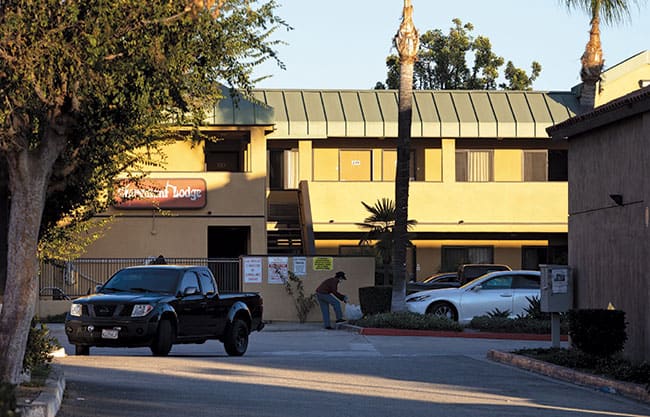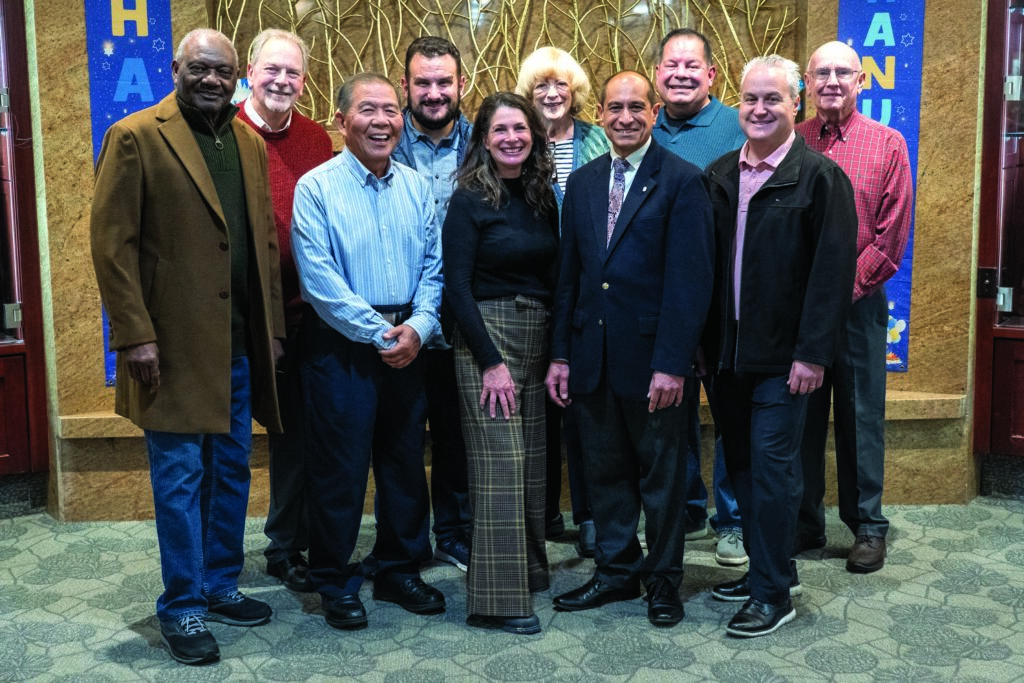Claremont police work to address growing prostitution problem

by Steven Felschundneff | steven@claremont-courier.com
The growing problem of prostitution in Claremont seems to have reached a crescendo in the last few months, with residents in the south part of town reporting a significant increase in women soliciting customers on the streets adjacent to the intersection of Indian Hill Boulevard and the 10 Freeway. There have also been reports of people having sex in vehicles parked on side streets in the area.
A father who called the COURIER recently said he routinely sees partially undressed women as he takes his children to school or soccer practice. Another resident complained during the November 4 Claremont Police Commission meeting that she encounters apparent prostitutes working the streets at all hours of the day. She said the problem has increased significantly over the past nine months and she no longer feels safe walking from her home below the 10 Freeway to the Super King Market.
The police have fielded multiple complaints from business owners, residents and passersby who want to know what the city is doing to address this problem.
In response, Lieutenant Karlan Bennett gave a presentation at the police commission meeting providing an update on the department’s response to citizen complaints about prostitution.
For decades, prostitution has been more of a problem in Pomona, specifically on Holt Boulevard. In the past, sex workers who stay in south Claremont hotels would discretely leave their rooms and not start working until they reached Holt. Recently, however, the prostitutes are being more bold and begin looking for customers as soon as they leave the hotel property.
“It’s become pretty apparent in talking with Pomona officers and their conversations with the people they are contacting, that Indian Hill Boulevard has become an extension of Holt Boulevard. So that is one of the reasons why we are talking about this here in the City of Claremont tonight,” Lieutenant Bennett said.
Claremont police conduct sting operations to apprehend the sex workers, their customers and pimps. The “John” sting is a common tactic in which an undercover police officer pretends to be a sex worker in ,order to entice a solicitation from someone looking to trade money for sex. Another approach is a reverse sting in which police attempt to contact a person advertising sex for money on social media. They also use observation details in which officers patrol in unmarked vehicles hope to see alleged violations in progress.
But as then Captain Aaron Fate, now the police chief, said in a recent presentation to the Claremont City Council, enforcement of misdemeanor sex laws is extremely rare in Los Angeles County due to the District Attorney George Gascon’s Special Directive 20-07. Under that directive, a host of misdemeanor crimes, including loitering to commit prostitution, are declined or dismissed before arraignment.
During a sting operation in September, Claremont police arrested nine people on prostitution related charges. At the police station, one individual did accept the offer of social services, the other eight were booked on the charges.
Claremont police partner with the Pomona Police Department’s Sexual Exploitation and Trafficking Team (SETT) to address prostitution enforcement. The department also works with the Federal Bureau of Investigation which has a specific human trafficking task force.
Human trafficking is a serious felony that can result in a long prison term, particularly if the offense involves a minor or “force, fear, fraud, deceit, coercion, violence, duress, menace, or threat of unlawful injury to the victim.”
A primary focus of police enforcement of these statutes is identifying victims of human trafficking with the goal of getting those individuals out of the exploitative situations. This is complicated by the fact that people involved in human trafficking move from state to state, so the resources of the FBI are crucial.
“When we go out and detain and arrest these sex workers, one of the key things that we have to do [in order to] identify a human trafficking victim, is remove [that person] from the area where they are. We need to get them into a secure area where we can talk to them,” Lieutenant Bennett said.
It’s crucial that the sex workers are taken to the police station because they are more likely to speak without the fear of reprisal from the trafficker, according to Lieutenant Bennett. Once they have the person off the street, the arresting officers asks a series of questions to ascertain whether the individual is being victimized.
“The human traffickers are watching them, they are in constant communication with them. It could be visually, they could be driving around, they could be parked watching them. They could also be texting them on their phones. So we are trying to remove them from that fear they are being constantly watched,” he said.
Even if a sex worker is not a victim of trafficking, one of the first things police do after the arrest is to offer the individual social services including counseling and shelters, and in the case of a minor, reuniting that person with a parent or responsible adult. Police also want to protect the sex worker from the potential violence or robbery from the “Johns.”
Commissioner Becky Margiotta said the issue of prostitution hit her radar after Councilmember Ed Reece posted on social media about the sting back in September. She expressed concern about the tone of the release with its “we got ‘em” message, which lacked the nuance of the police work that Lieutenant Bennett described.
“I know there are no good statistics nationally about the percentage of people involved in prostitution who are being trafficked, but I know it is some. I think that is awful, that is modern day slavery,” Commissioner Margiotta said. “And I think from what I could see on Ed Reece’s comments, there are people in the community who were far more concerned about trafficking than about prostitution.
“I get it, I don’t want someone doing that in a car outside of our house either. I hear you are working with Pomona and the FBI [but] all I have seen since moving to Claremont is press releases about the prostitutes being arrested. I think there is a greater interest in the community [for] understanding more of the nuances of what is actually going on. Are we really getting at the human slavery that is happening?”
Commissioner Caleb Mason asked if the city is ready to crack down on the hotels where the crimes seem to be originating, which reflects the will of many residents in the area. He suggested forming an ad hoc committee to explore the options including putting pressure on the city council to act.
“It seems pretty evident to me that there is a locus of crime of all sorts across the spectrum that is associated with particular businesses that don’t seem to be doing anything about it,” he said.
Lieutenant Bennett responded that the department works closely with the managers of the hotels and that officers are present there many times a day but certainly don’t have a permanent presence. He did note that one of the hotels had recently hired a security guard.
During public comment Jim Keith brought up Special Directive 20-07 and some people’s apparent disregard for the law due to the lack of repercussions.
“And that [special directive] applies not only to the women but that applies to the Johns. So if the police go through this whole effort to have a female officer impersonate a prostitute and arrest somebody, he is going to walk right out with a citation and get a letter that there will be no follow up by the court. Just as well as the young women will be. I think it’s atrocious. I don’t know why we as a community tolerate that kind of total hands-off [approach] on the issue of prostitution.”
The commission did form an ad hoc committee, including Margiotta, Mason and Frank DeLeo, to explore the options of controlling crime at the hotels.










0 Comments